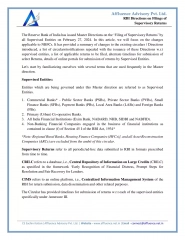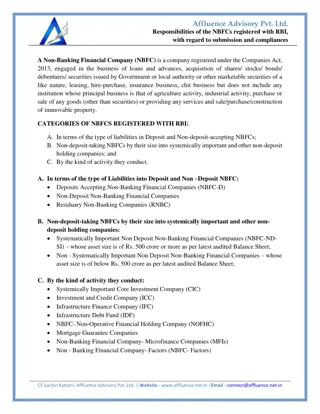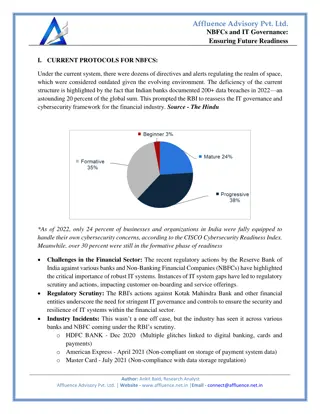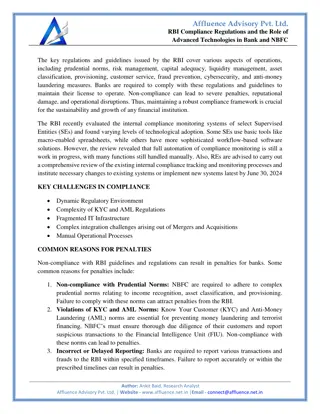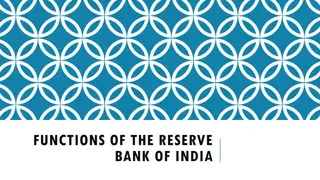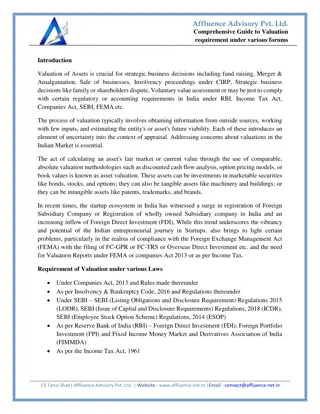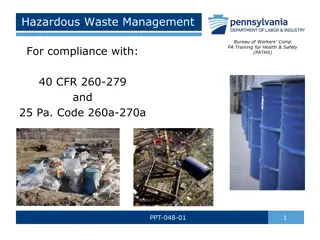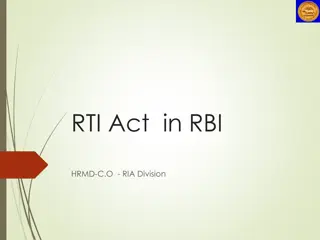RBI Directions on Filings of Supervisory Returns
RBI issues new Master Directions on 'Filing of Supervisory Returns,' emphasizing NBFCs. Timelines, revised applicability, and online portals introduced for streamlined filing. Physical submission required for Form A Certificate.
1 views • 5 slides
Responsibilities of the NBFCs registered with RBI, with regard to submission and compliances
India's regulatory framework for Non-Banking Financial Companies (NBFCs) under the RBI, covering prudential norms, compliance, penalties, and the shift to online filing via XBRL, highlighting the sector's emphasis on transparency, risk management, and technological integration.
1 views • 6 slides
Responsibilities of the NBFCs registered with RBI
India's regulatory framework for Non-Banking Financial Companies (NBFCs) under the RBI, covering prudential norms, compliance, penalties, and the shift to online filing via XBRL, highlighting the sector's emphasis on transparency, risk management, and technological integration.
2 views • 6 slides
Scale Based Regulation 2023 - Non-Banking Financial Company (NBFCs)
On October 19, 2023, the Reserve Bank of India (\u201cRBI\u201d) has issued \u2018Master Direction \u2013 Reserve Bank of India (Non-Banking Financial Company \u2013 Scale Based Regulation) Directions 2023\u2019 (\u2018SBR Master Direction\u2019). The SBR Master Direction aims to harmonize the Previ
0 views • 9 slides
Understanding Quantitative Credit Control Methods in RBI's Monetary Policy
RBI's monetary policy revolves around maintaining credit quantity in the market through quantitative credit control methods. This includes Bank Rate Policy, Open Market Operations, Cash Reserve Ratio (CRR), and Statutory Liquidity Ratio (SLR). These tools help regulate credit flow, liquidity, and ma
4 views • 8 slides
RBI
Reserve Bank of India(RBI)\nThe Reserve Bank of India(RBI) is the Controlling Institution of all Banks in India. It is formed by an Act. It\u2019s owned by the Indian government\u2019s Finance Ministry and takes care of things like inflation, interest rates, lending, and ensuring the financial stab
1 views • 5 slides
NPA Through Lens of RBI
Gain insights into non-performing asset management from the perspective of RBI through the experiences and expertise shared by CA Gopal Dhakan. Explore topics such as Bank Branch Audit, Neo Banking, Fee Structure Changes, and Reimbursement Policies, offering valuable information for professionals in
3 views • 43 slides
NBFCs and IT Governance-Ensuring Future Readiness
The RBI's regulations aim to ensure NBFCs uphold strong cybersecurity standards, safeguarding consumers and enhancing trust in the financial sector, particularly in light of recent incidents such as Paytm Payment ban (Jan 2024) due to significant KYC irregularities, deficiencies observed in loan san
6 views • 8 slides
Understanding Producer Responsibility in UK: Regulations for Sustainable Vaping
Producer Responsibility in the UK entails businesses taking accountability for the environmental impact of their products, including packaging, electrical equipment, batteries, and end-of-life vehicles. This responsibility extends to vapes as they fall under the Waste Electrical and Electronic Equip
0 views • 10 slides
Overview of Banking Institutions and Types
Banking institutions play a crucial role in the economy by accepting deposits from the public and providing financial services. They are classified into various types such as commercial banks, investment banks, cooperative banks, and central banks. Commercial banks cater to the working capital needs
1 views • 13 slides
RBI Compliance Regulations and the Role of Advanced Technologies in Bank
Technological solutions play a pivotal role in enhancing compliance management for NBFCs. By leveraging tech solutions for suspicious transaction detection, RPA for automating compliance tasks, blockchain for secure record-keeping, NLP for regulatory
0 views • 5 slides
Evolution of Reserve Bank of India: A Historical Overview
The Reserve Bank of India, established in 1935 and headquartered in Mumbai since 1937, has played a crucial role in India's financial landscape. From nationalization in 1949 to financial reforms in 2000, this summary covers key milestones in RBI's history, including regulatory expansions, nationaliz
0 views • 18 slides
Developmental Functions of Reserve Bank of India
Reserve Bank of India (RBI) plays a crucial role in promoting economic growth through various developmental functions. These include promoting agricultural finance, industrial finance, finance for exports, banking, and framing monetary policy. RBI works towards providing institutional credit to agri
0 views • 7 slides
Functions of the Reserve Bank of India
The Reserve Bank of India plays a crucial role in regulating the monetary system to achieve economic growth and stability. It performs traditional functions, including central banking functions like issuing currency, regulating credit, and acting as the banker's bank. The RBI's functions are categor
0 views • 11 slides
Understanding Sale of Stressed Loans: Accounting and Valuation
Explore the nuances of selling stressed loans including accounting treatment, valuation aspects, and motivations for transfer. Learn about stressed loans, RBI's asset classification norms, and considerations for both transferors and transferees in the sale process. The article delves into the implic
0 views • 17 slides
Qualitative Credit Control Methods Explained
Selective/Qualitative credit control methods involve regulating the quality and direction of credit flows by implementing controls such as ceilings on credit, margin requirements, discriminatory interest rates, directives, direct action, and moral suasion. These methods are used by central banks lik
0 views • 7 slides
Understanding Different Types of Companies in Business
Explore the various kinds of companies in the business world, including statutory companies, registered companies, private companies, public companies, and more. Learn about the differences between private and public companies, statutory company examples like LIC and RBI, and the characteristics of
0 views • 25 slides
Understanding Treasury Bills Market and its Significance in Finance
The treasury bills market is where finance is provided against government-issued short-term promissory notes. These bills are considered safe and liquid assets with maturity periods of 91, 182, or 364 days. Major participants include the RBI, commercial banks, and other financial institutions. Treas
0 views • 6 slides
Understanding U.S. Export Control Regulations
U.S. export control regulations are crucial for national security, foreign policy, and economic interests. This includes governing the export of strategic technologies, equipment, hardware, software, and the provision of technical assistance to foreign persons. The regulations aim to prevent the una
0 views • 68 slides
UNR WLTP: Regulations Update for Vehicle Type Approval
This document details the transposition of GTR15 (WLTP) and GTR19 (Evap) into UN Regulations, focusing on the scope, definitions, and application for approval of vehicle categories M1, M2, N1, and N2. It outlines requirements for emissions testing, carbon dioxide, fuel consumption, electric energy c
0 views • 38 slides
Understanding AML Risk Assessments and Due Diligence Regulations
Anti-money laundering (AML) risk assessments and due diligence regulations are crucial for preventing money laundering and terrorist financing. This content discusses the importance of risk assessments, client due diligence, and regulatory compliance in the AML landscape. It emphasizes the need for
0 views • 13 slides
Quantitative Credit Control Methods in RBI's Monetary Policy
The Reserve Bank of India implements quantitative credit control methods to regulate the credit structure and maintain a balanced money supply. These methods include bank rate policy, open market operations, cash reserve ratio (CRR), and statutory liquidity ratio (SLR). By utilizing these tools, RBI
0 views • 8 slides
Developmental Functions of RBI - Promoting Economic Growth
The Reserve Bank of India (RBI) performs various developmental functions to promote economic growth, including agricultural finance promotion, industrial finance support, export finance encouragement, banking structure promotion, and monetary policy formulation. RBI plays a crucial role in providing
5 views • 7 slides
Withholding Taxes and Revenue Regulations Overview
The content delves into the concept of withholding taxes, particularly final and creditable withholding taxes, as per Revenue Regulations No. 02-98. It explains the responsibility of withholding agents, the distinction between final and creditable withholding tax systems, and the implications for pa
0 views • 20 slides
Comprehensive Guide to Valuation requirement under various forum
Explore our comprehensive guide on asset valuation in India, covering essential compliance with RBI, SEBI, FEMA, and Companies Act regulations. Learn about best practices, DCF method, and critical documentation needed for strategic business decisions
0 views • 3 slides
Implementation of Public Servants Business Prohibition Regulations
The presentation outlines the purpose and background of the Revised Determination on Other Remunerative Work to prohibit public servants from conducting business with state organs. It highlights measures in place, statistics on employee compliance, progress reports provided by departments, and the r
0 views • 21 slides
Regulations on 1,2,3-Trichloropropane (1,2,3-TCP) Contaminant Levels
State Water Board conducted a public hearing regarding the regulations on 1,2,3-TCP, a carcinogenic chemical found in groundwater. The proposed regulations aim to set Maximum Contaminant Levels (MCL) and other safety measures to protect public health. Stakeholder meetings and public workshops were h
1 views • 21 slides
Understanding U.S. Export Regulations and Agencies in 2015
Explore the complexities of exporting from the USA in 2015, covering responsibilities of exporters, types of exports, government agencies regulating exports, and an overview of export controls and regulations. Learn about the Bureau of Industry and Security, Directorate of Defense Trade Controls, Of
3 views • 25 slides
Understanding Export Controls and Regulations in the United States
This content provides insights into export controls and regulations, covering topics such as Federal Export Control restrictions, definitions of U.S. Person and Foreign National, Technology Control Plans, Deemed Export discussions, and oversight by Federal agencies like the Department of Commerce, S
0 views • 20 slides
New Regulations on Neonicotinoids in California: An Overview
The presentation by the California Department of Pesticide Regulations highlights the new regulations on neonicotinoids, systemic pesticides affecting insects' central nervous systems. It provides insights into the history of neonicotinoid use in California, the development of alternative pesticides
0 views • 19 slides
Clinical Research Guidelines and Regulations Overview
Clinical research encompasses various guidelines and regulations to ensure the protection of human subjects and the credibility of study results. Key aspects include Good Clinical Practice (GCP) standards, Title 45 of the Code of Federal Regulations (CFR) Part 46, and additional CFR sections for cli
0 views • 46 slides
GMO Regulations in Sri Lanka: An Overview of Biosafety and Prohibitions
Sri Lanka's biosafety regulations of 2019 exempt certain cases involving genetically modified (GM) ingredients in processed foods. The regulations outline prohibitions on the import, sale, and distribution of GM organisms as food without approval. Additionally, the regulations address risks in proce
0 views • 12 slides
Development and Review of CNS Regulations for Civil Aviation Oversight
Regulations play a crucial role in ensuring safety and efficiency in civil aviation. This involves the timely development, review, and enforcement of regulations to keep pace with industry amendments. Different types of regulations, from restrictive to permissive, impact how oversight is conducted.
0 views • 34 slides
Understanding Banking Institutions and Their Types
Banking institutions play a vital role in the financial sector by mobilizing public savings and providing funds to meet various financial needs. Commercial banks, investment banks, co-operative banks, and central banks are some examples of banking institutions. Scheduled banks enjoy certain benefits
0 views • 17 slides
Hazardous Waste Management Regulations in Pennsylvania
The hazardous waste management regulations in Pennsylvania outline compliance standards for handling hazardous waste, including storage, identification, transportation, recordkeeping, and emergency response. These regulations incorporate both federal guidelines under RCRA and state-specific requirem
0 views • 122 slides
Ruer Bo kovi Institute Overview and SEND Online Presentation
Ruer Bo kovi Institute, founded in 1950, is the largest Croatian research institute in the field of science. The institute has 2 locations, 11 divisions, 3 centers, 82 research laboratories, and a vast library. SEND 1.0 is an electronic document acquiring system established in the RBI library, strea
0 views • 13 slides
Overview of Foreign Exchange Regulations Act 1973 in India
The Foreign Exchange Regulations Act (FERA) of 1973 in India imposed strict regulations on foreign exchange transactions, payments, and securities dealings. It included restrictions on currency import/export, illegal payments, dealings in foreign exchange, export payments regulated by RBI, bearer se
0 views • 4 slides
Overview of Reserve Bank of India (RBI) Functions and Responsibilities
The Reserve Bank of India (RBI) plays a crucial role in the country's financial system as the central bank. Established in 1935, its key functions include monetary management, regulating the financial system, managing foreign exchange reserves, issuing currency, and promoting national objectives thr
0 views • 27 slides
Insights into Merchanting Trade for International Transactions
Merchanting trade involves the shipment of goods from one foreign country to another foreign country with the involvement of an Indian intermediary. This concept promotes international trade and is governed by specific guidelines issued by RBI. The transaction must meet certain conditions to be clas
0 views • 7 slides
Impact of Recent Regulations on Partnership Allocation Rules
Recent regulations drastically impact partnership allocation rules related to determining partner liabilities, basis, disguised sales, and more. The regulations under IRC 704 have been revised, and changes have been proposed to reduce tax regulatory burden. The 2014 proposed regulations and the 2016
0 views • 43 slides
